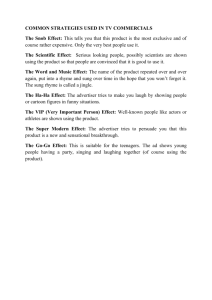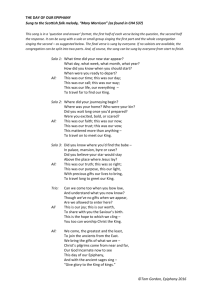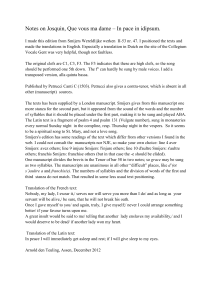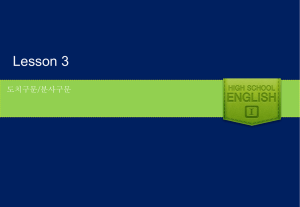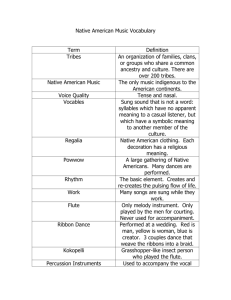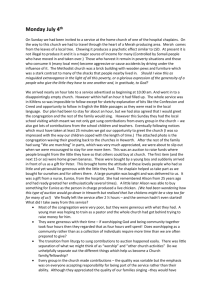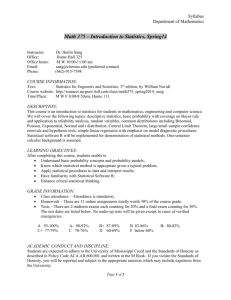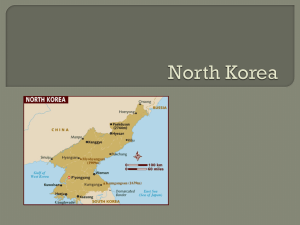CD Review 45 - Dr David Wright
advertisement
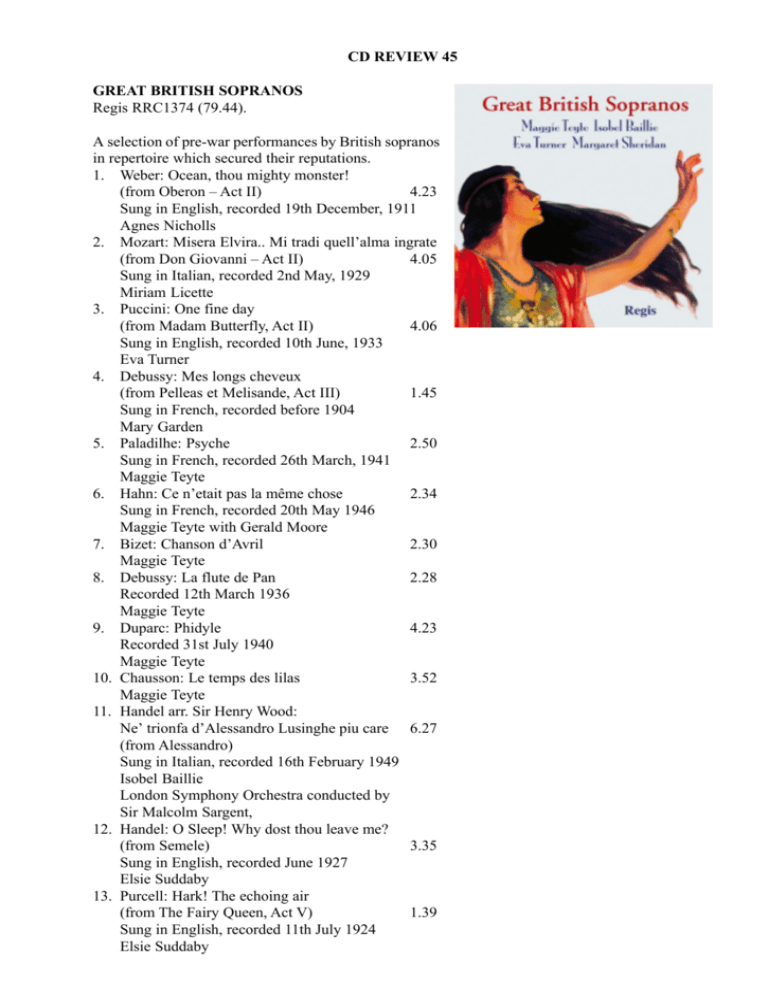
CD REVIEW 45 GREAT BRITISH SOPRANOS Regis RRC1374 (79.44). A selection of pre-war performances by British sopranos in repertoire which secured their reputations. 1. Weber: Ocean, thou mighty monster! (from Oberon – Act II) 4.23 Sung in English, recorded 19th December, 1911 Agnes Nicholls 2. Mozart: Misera Elvira.. Mi tradi quell’alma ingrate (from Don Giovanni – Act II) 4.05 Sung in Italian, recorded 2nd May, 1929 Miriam Licette 3. Puccini: One fine day (from Madam Butterfly, Act II) 4.06 Sung in English, recorded 10th June, 1933 Eva Turner 4. Debussy: Mes longs cheveux (from Pelleas et Melisande, Act III) 1.45 Sung in French, recorded before 1904 Mary Garden 5. Paladilhe: Psyche 2.50 Sung in French, recorded 26th March, 1941 Maggie Teyte 6. Hahn: Ce n’etait pas la même chose 2.34 Sung in French, recorded 20th May 1946 Maggie Teyte with Gerald Moore 7. Bizet: Chanson d’Avril 2.30 Maggie Teyte 8. Debussy: La flute de Pan 2.28 Recorded 12th March 1936 Maggie Teyte 9. Duparc: Phidyle 4.23 Recorded 31st July 1940 Maggie Teyte 10. Chausson: Le temps des lilas 3.52 Maggie Teyte 11. Handel arr. Sir Henry Wood: Ne’ trionfa d’Alessandro Lusinghe piu care 6.27 (from Alessandro) Sung in Italian, recorded 16th February 1949 Isobel Baillie London Symphony Orchestra conducted by Sir Malcolm Sargent, 12. Handel: O Sleep! Why dost thou leave me? (from Semele) 3.35 Sung in English, recorded June 1927 Elsie Suddaby 13. Purcell: Hark! The echoing air (from The Fairy Queen, Act V) 1.39 Sung in English, recorded 11th July 1924 Elsie Suddaby 14. Delius: Cradle Song Recorded 24th June 1929, Dora Labette 15. Delius: The Nightingale Recorded 24th June 1929 16. Delius: Evening Voices (Twighlight Fancies) Recorded in 10th July 1929, Sung in English Dora Labette with Thomas Beecham ( piano) 17. Adam: Variations on a Nursery Theme ‘Listen Mother, to my tale’ Sung in English, recorded 7th March 1949 Gwen Catley Flute obligato by Lionel Solomon, orchestra conducted by Eric Robinson, 18. Puccini: Madam Butterfly Bimba dagli occhi (Love duet: Act 1) Sung in Italian, recorded 1927 Margaret Sheridan Orchestra of La Scala, Milan conducted by Carlo Sabanjo, with Aureliano Pertile (tenor). 19. Un bel di vedrimo (Act II) Sung in Italian, recorded November 1926 Margaret Sheridan 20. E questo? (Act II) Sung in Italian, recorded November 1927 Margaet Sheridan, Orchestra conducted by Eugene Goosens, 21. Puccini: Si, mi chiamano Mimi (from La Boheme, Act I) Sung in Italian, recorded 1926 Margaret Sheridan 2.15 2.00 4.10 4.18 8.31 4.28 4.13 4.39 The sleeve notes for this welcome CD are brief and so I would like to give a few details about the ten sopranos on this CD. It is important that we do not forget the great singers of the past. There are some slightly differing opinions about the singers dates, I should add. Agnes Nicholls was born on 16 July 1876 in Cheltenham, the daughter of a draper, who loved music. She studied at RCM and sang before Queen Victoria three times at Royal command. She was excellent at Mozart and superb in Wagner with the roles of Venus, Sieglinde and Brunnhilde. Hans Richter conducted her in a Ring Cycle in 1908. Four years earlier, in 1904 she married the Irish composer and conductor Hamilton Harty who died in 1941. He was the man who inspired the Halle Orchestra (1920 -1933) to a high standard which dropped after his death and declined drastically in the Barbirolli years (1943-1970) and was redeemed and became a fine orchestra under Skrowaczewski (1984-1992). Nicholls toured periodically including a tour to Australia. She had a pure voice and a fine sense of drama. She died in London on 21 September 1959. As for Miriam Licette, she was born at Over, Chester on 9 September 1892. She studied in Italy with Melba's teacher and with Melba herself. Among her many roles, she sang Marguertie in Gounod's Faust, Micaela in Bizet's Carmen, Pamina in The Magic Flute, Antonia in Offenbach's Tales of Hoffmann, Licetta in Charpentier's Louise and in the UK premiere of Bizet's The Fair Maid of Perth. In 1918, she sang Sieglinde in Wagner's Die Walkure. She sang in a revival of Delius's A Village Romeo and Juliet and in the UK premiere of Hindemith's Cardillac. She died in a Reading hospital on 11 August 1989. The widely-held view that only modern singers can tackle these demanding roles is absurd. Dame Eva Turner was a star. She was born on 10 March 1892 in Werneth, Lancashire and began her career as a member of the chorus of the Carl Rosa Opera Company. She sang the taxing roles of Wagner very well as well as Bizet, Puccini and in Beethoven's Fidelio. Toscanini took her up for the 1924-1925 season at La Scala, Milan, where she sang the Wagner roles of Freia and Sieglinde. She was outstanding in Puccini's Turandot. When Ralph Vaughan Williams wrote his gorgeous Serenade for Music,which employed sixteen solo singers, he composed lines especially for Turner. On retiring in 1948, she became Professor of Voice at the University of Oklahoma and, on returning to London in 1959, was Professor of Voice at RAM. She was made a DBE in 1962. She died on 16 July 1990, aged 98. The recording of Mary Garden on this disc was made before 1904. She was born in Aberdeen on 20 February 1874 and enjoyed a career in France and the USA. She was also an actress working with Oscar Hammerstein and was a talent scout for MGM. She is well know for her role as Melisande in Debussy's Pelleas and Melisande which is regarded as a poor opera. She also sang in Massenet's Cherubin. She died on 3 January 1967. I have never warmed to Maggie Teyte who was born in Northampton on 17 April 1885. She studied at the Royal School of Music and in Paris where she sang Cherubino in Mozart's Magic Flute and Zerlina. She moved to America and sang with the Chicago Opera Group (1911-1914) and the Boston Opera Group (1914-1917). She returned to Britain in 1919 and, two years later, married for the second time to a Canadian millionaire Sherwin Cottingham. Like her first marriage to Eugene de Pluman (1909 -1915) this union also ended in divorce. In the 1930s she worked with the pianist Alfred Cortort mainly in songs by Debussy. She appeared in New York in 1948. She was created a Dame in 1958 and died in London on 26 May 1976. She never seemed to fit in anywhere and, on this disc, her performance of Bizet's Chanson de Avril is too fast. Listen to the excellent recorded performance by Jill Gomez. Isobel Baillie was born in Hawick on 9 March 1895 and made her name mostly in oratorio. She taught at RCM (1955-1957 and 1961-1964), Cornell University (1960-1961) and Manchester School of Music from 1970. She was a tutor to Kathleen Ferrier. She received the CBE in 1951 and was made a DBE in 1978. She died in Manchester on 24 September 1983. Having spoken to many singers who studied with her, I am told that she was neither a good teacher or a winsome personality and was very limited. A different type of person was Elsie Suddaby, a very fine lyric soprano born in Leeds on 5 June 1893. She was active and admired between the two world wars and one of the original soloists in Ralph Vaughan Williams 's Serenade to Music. She had studied with Sir Edward Bairstow and was known as the Lass with the Delicate Air, for obvious reasons. A room in Leeds Town Hall is named after her. She really was an amazing singer. She died in Radlett, Hertfordshire on 2 April 1980. Dora Labette was born in Purley, Croydon in 1898. She won many prizes at the Guildhall School of Music (GSM) and her career was largely based on song and oratorio. Encouraged by Beecham, who was an advocate of Delius, Dora sang Delius songs accompanied by Beecham some of which are on this CD. It was rumoured that she born Beecham a son. She was certainly an attractive woman and a fine singer. She died in Purley in 1984. And so to Gwen Cately, born In London on 9 February 1906. She was short in stature measuring only four foot eleven but she had a high colouratura voice and was quite brilliant. She studied at GSM with Sir Landon Ronald. In 1936, she married the cellist Allan Ford. She was very good in Mozart, Verdi and Puccini, Edward German, Gounod and Offenbach. During World War ll, she was in a revue, Hi-de Hi at the Palace theatre presented by jack Hylton where she sang operatic arias. She died at Hove on 12 November 1996. Finally, we come to Margaret Sheridan who was not British but Irish, born in Castletown, County Mayo on 15 October 1889. She was orphaned at the age of four and brought up in a Dominican Convent in Dublin. She trained in Italy and had a short career in the 1920s when she was very popular. She was admired in Madame Butterfly. She was known as the Irish Nightingale but she would say that she was Maggie from Mayo. She may not have had the greatest skill which is why she retired in 1930. She died in Dublin on 16 April 1958. I could go through all 21 tracks but time and space does not permit. While each track has its merits, Eva Turner singing One Fine Day, Suddaby singing Handel and Purcell are my highlights. Singers of the past but just as good as singers of today? © COPYRIGHT David C F Wright DMus 2011. This article or any part of it, however small, must not be copied, quoted, reproduced, downloaded or altered in any way whatsoever nor stored in any retrieval system. Failure to comply is in breach of International Copyright Law and will render any offender liable to action at law. If anyone in the UK particularly has difficulty obtaining any CDs will they please contact Record Corner, Godalming, Surrey, telephone 01483 422006 and ask for Tom Briggs or his staff.
